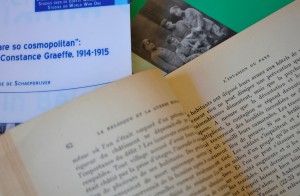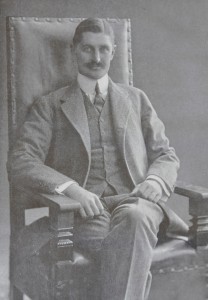Mercredi 14 avril 1915
Rue de la Régence, deux petites filles sautaient à la corde en chantant La Marseillaise. Des officiers allemands passèrent, entendirent, regardèrent…et sourirent. Et les deux petites continuèrent sans se douter qu’elles risquaient dex ans de prison!
[Wednesday, 14th April 1915
Rue de la Régence, two young girls were skipping rope singing La Marseillaise. Some German officers passed by, heard, watched…and smiled. And the two little girls continued without suspecting that they risked two years in prison!]
So wrote the Brussels-based journalist, play-wright and author Paul Max (1884-1944). His is one of many voices which can be found among the collections of the IHR library, which illustrate the varied reactions, both within government and society at large, to the German Empire’s occupation of Belgium from August 1914 to November 1918.
Initially Max’s account of life in Brussels is filled not only with vignettes of the German presence (as one might expect) but also more pleasant aspects, a trip to the theatre (13th March, 1915) or a day playing bowls (26th May 1915). Unfortunately, these types of entries are seldom made as the diary progresses with accounts of air raids (the 7th June 1915, the 7th September 1916 and the 27th September 1916, for example), swift arrests (22nd June 1915), rising prices and economic deprivation (1st February 1917, 8th November 1917, 15th October 1918) becoming the norm.

The diary of Constance Graeffe (1874-1950) also documents life in occupied Brussels but has a very different tone. With the knowledge that her and her German husband, Otto Graeffe, would eventually renounce their Belgian citizenship, becoming Reichsdeutschen on the 1st June 1917 one should not be too surprised that a major theme throughout her diary is the equivocation she displays between the fondness she has for Germany and the growing hostility she feels in Brussels:
I do not know how I shall bear all this feeling of hatred which pours out of every eye which rests on one, if one has the misfortune of being with any one who is German. I often wonder however that hatred will leave the Belgians? I must not think too much of all this or I would go mad. (17th June, 1915).
Her portrayal of suffering must be tempered, however, by her – almost eager – acceptance of Germany’s justification for its actions during the invasion. In the first months of the war, Graeffe would accept as fact the German explanation for its brutality during the invasion, the civilian guerrilla forces dubbed the Franc-tireurs:
…all along Belgium as the German came along…the men (not soldiers) & women & children began to shoot at them. (27th August 1914)
Mention of the Franc-tireurs is also made in other sources held by the IHR’s library, but in a very different context. The Documents pour servir à l’histoire de l’invasion Allemande dans les provinces de Namur et de Luxembourg was compiled and edited in the early 1920s by the abbot of Maredous, Norbert Nieuwland and Jean Schmitz, secretary to the bishop of Namur. The eight volume work offers a comprehensive account of the invasion but paints a very different picture than either Max’s or Graeffe’s diaries. As outlined by the editors, the work sought to, ‘montrer par des témoignages de première main, quel est le régime, quels sont les traitements que l’armée allemande a fait subir à la population civil durant l’invasion’, dedicating it, ‘à la mémoire de tous morts et martyrs’ (vol. 1, xi-xii). Given this statement of intent, such incidence such as the civilian massacres at Tamines and Dinant (to name only two) are described in hundreds of accounts published in each volume.
Accounts from the German perspective tend not to dwell on these horrific events. The reports and memoirs by German diplomat and head of a Politische Abteilung throughout the occupation, Oscar von der Lancken-Wakenitz (1867-1939) mention little of the initial invasion, giving details, instead, on the day to day concerns of the German administration such as the staunch defiance of the Belgian Cardinal Mercier (Nov. 1915-Jan. 1916, pp. 164-168 & Aug. 1916-Jan. 1917, pp. 233-236) as well as the implementation of Flamenpolitik, a policy which sought to widen societal fissures between the Flemish and Walloon population, promoting the status of the Flemish (viz. Germanic) culture over the southern Francophone Walloons (Meine dreissig Dienstjahre, pp. 211-220; see also Les archives du Conseil de Flandre).
In terms of a legacy, the noted Belgian historian, Henri Pirenne (1862-1935) saw efforts to divide Belgium through policies such as Flamenpolitik as being ultimately futile. Although we have seen even in this tiny sample opinion was far from uniform (when is it ever?), looking back and reflecting on the German administration and the Belgium that emerged after war, Pirenne would conclude in 1928
L’administration imposée par l’Allemagne à la Belgique n’était que la conséquence de la victoire. Elle devait crouler avec la défaite et elle le fit tout d’une pièce et d’un seul coup…Matériellement le pays était ruiné, moralement il restait intact. (p. 272)
[The administration imposed by Germany on Belgium was only the consequence of victory. It crumbled with defeat and it collapsed in one fell swoop…Materially the state [Belgium] was ruined, morally it remained intact.]
All the material discussed above can be found in the IHR library’s Belgian, Low Countries Local, Military and International Relations collections and notice of any future acquisitions in this subject can be found on the library pages of the IHR website.
More details of events held at the IHR, including this year’s Anglo-American Conference, The Great War at Home, can be found on the Institute’s Events page.
Sources
Graeffe, Constance. “We who are so cosmopolitan”: the war diary of Constance Graeffe, 1914-1915, ed. Sophie de Schaepdrijver.
Lancken-Wakenitz, Oscar von der. Meine dreissig Dienstjahre 1888-1918 : Potsdam-Paris-Brüssel.
Lancken-Wakenitz, Oscar von der. Gouverner en Belgique occupée : Oscar von der Lancken-Wakenitz – rapports d’activité 1915-1918, ed. Michaël Amara et Hubert Roland.
Max, Paul. Journal de guerre de Paul Max : notes d’un Bruxellois pendant l’occupation (1914-1918), ed. Benoît Majerus & Sven Soupart.
Pirenne, Henri. La Belgique et la Guerre Mondiale.
Raad van Vlaanderen. Les archives du Conseil de Flandre, published by the Ligue nationale pour l’unité belge.
Schmitz, Jean & Nieuwland, Norbert (eds.). Documents pour servir à l’histoire de l’invasion Allemande dans les provinces de Namur et de Luxembourg.

